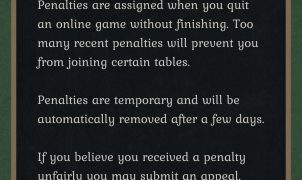In the United States and Canada, perhaps the most popular style of Pinochle is four players with partners and 4-card passing. This is the variation featured here on this site.
In this form of the game there are two 2-person teams playing against one another. Whichever team wins the bidding gets to choose the trump and exchange 4 cards with their partner. Each player gets points for the melds in their individual hand, and then each player’s points are combined with their partner’s. Similarly, each player earns trick points for pointer cards taken (Aces, Tens, and Kings). At the end of the hand each player’s trick points are combined with their partner’s and added to their meld score. If the high-bidding team makes their bid they get to keep their points but if they come up short, instead, their bid amount is subtracted from their score. The non-high-bidding team gets to keep the points they earned during the hand regardless.
To begin, the dealer shuffles the deck and deals out the entire deck to each player, 3 cards at a time if single deck or 5 cards at a time if double deck. Once all cards are dealt, each player picks up and examines their cards and the bidding begins starting with the player to the dealer’s left. Each player must either increase the bid or pass until there is only one player remaining. The high bidder wins the bidding and then gets to declare which suit will be trump for the hand. After the trump is announced, the high bidder’s partner then chooses 4 cards from their hand to slide across the table face-down to their partner. The high bidder examines these cards and then chooses 4 cards from their hand to pass back.
After the high-bidding team passes cards to each other, each player identifies melds in their hand, showing the cards in each meld to all other players and then meld points are totaled. After all melds are counted, the trick-taking phase begins starting with the high bidder.
Bidding Strategies
Each player wants to win the bidding so that they can choose the trump and pass cards with their partner. But it is important not to over bid, as this will result in negative points, and you certainly don’t want to get into a bidding war with your own partner. If you have a mediocre hand, and your partner is bidding strong, you should yield and let your partner take it. On the other hand, if you have very strong cards with a lot of melds or heavy on Aces then go in strong and bid until you take it or until your opponents bid above your maximum.
The first thing to look for when estimating your hand’s worth is how many melds you already have starting out with. If you’re lucky enough to get a run in your initial hand you can probably safely bet up to 30, and might consider going as high as 32. You know that you’ll be guaranteed to get at least 15 meld points and if you play well you should be able to collect at least another 15 points from tricks. There’s a good chance you’ll improve your hand even more after passing cards with your partner. If you have any incidental marriages or a pinochle, it’s safe to increase your maximum bid to 35-40. If you have a double pinochle, go as high 40-45. If you have Aces around, you should be bidding between 25-30. If you have Kings around or Queens around, maybe 20-25. However, if you don’t have any of these things, or just a single marriage or pinochle, you might not want to bid much higher than 20, and it may be best to pass and hope your partner has something better.
The next thing to consider is whether or not you’re close to getting a meld, and think about how likely it is you’ll get the cards you need from your partner. If you’re close to getting a run and only missing one card, there’s a 66% chance your partner will have the card you need, and they are likely to pass it to you if you choose that suit to be trump. Similarly, if you have Aces in three suits, and you have enough cards in the suit of your missing Ace to make that suit trump (at least 4 or more), there’s a good chance you’ll get the forth Ace to make Aces around. If you have a single pinochle and either a second Queen of Spades or a second Jack of Diamonds, there’s a 33% chance your partner will have the missing card to make a double Pinochle.
Before taking a chance on getting a missing card, ask yourself, what if I don’t get the card I need? Do you have enough Aces or trump cards to make up for it in tricks? There are a total of 25 trick points to be had. If you have six or more cards of the same suit and at least 3 or more Aces, you might be able to get between 20-25 trick points if you play well. However, if you don’t have a lot of trump cards or Aces, you may end up with 15 points or less. If this is all you can expect then it’s probably not worth the risk of bidding over 20.
Passing Cards with Your Partner
If your partner is the high bidder you should try to give them the best cards you have to help them make melds, control the tricks, and collect as many trump cards as possible.
Generally, you start by looking as any cards in your hand that are in the suit that your partner made trump. If you have a lot of trump cards to choose from, and multiples of the same trump card (for example 2 Kings or 2 Queens) try to give your partner one of each versus two of the same, as you can’t be sure what card or cards they may be missing to make their melds, this will maximize the chances of getting the right one. If you don’t have many trump cards to pass, then next you should consider passing any Aces as these will help your partner dominate the trick-taking. Another consideration is helping your partner making Pinochles. For example, if your partner choses Spades to be trump and you have a Jack of Diamonds, consider passing this as there’s a good chance your partner has the Queen of Spades. Likewise, if your partner chooses Diamonds to be trump consider passing your Queen of Spades. However, remember Pinochle’s are only worth 4 points so this shouldn’t be your first choice; only consider this if you don’t have many trumps or Aces to pass.
If you’re the high bidder, hopefully your partner will pass you some good cards to give you a run or other melds, and/or a lot of Aces or trump cards so you can win tricks. When you’re the high bidder, you’re in the driver seat and it’s going to be primarily up to you to win as many tricks as possible for your team. With that in mind, you want to keep all the good cards for yourself and pass your partner back your table scraps.
However, there are some opportunities to help your partner get a few extra points that you should think about when passing back. For example, if you have any Jacks of Diamonds or Queens of Spades that aren’t trump cards and aren’t part of any other melds, you might as well pass these to your partner in case they have the other pair in a Pinochle. If you have any unpaired non-trump Kings or Queens that aren’t part of any other melds, you can pass these to possibly help your partner get a one or more marriages. Also, if you have any non-trump Tens, you might consider passing these so your partner can throw them in tricks that you’re destined to win so you can collect the pointers. If none of these are options, then just get rid of Nines or non-trump Jacks.
Trick-Taking Strategies
When you’re the high bidder, you want to dominate the trick-taking and try to control the start of as many tricks as possible. Many people start with their trump Aces as these are guaranteed to win and will draw out trump cards from your opponents. Next, you should consider playing any non-trump Aces. These are usually safe to play early in the hand as long as your opponents have at least one or two cards in that suit, but if you play them towards the middle of the hand you may lose to a trump. If you had both Aces of the trump suit then it’s safe to proceed to play any trump Tens and then trump Kings, but don’t play these if both trump Aces haven’t been player yet as you don’t want your opponents to get the points for these assuming they have the un-played Ace. In this situation, it’s better to throw your lower trump cards (Nines, Jacks, Queens) to attempt to force your opponent to use the trump Ace. You’ll lose control of the tricks but at least you’ll know the trump Ace is out of play. A final consideration is that you get an extra point for taking the last trick so it’s a good idea to save some trump cards for the end of the hand if you can. Try to get rid of your junk cards in the middle of the hand, and then take back control with your trumps towards the end.
When your partner is the high bidder, your main objective is to give them pointers. If your partner throws and Ace that is probably going to win the trick, you should throw any Kings or Tens you can so your partner will get the points for these. If your opponents throw a card that’s most likely to win, then try to throw a Nine, Jack or Queen so they won’t get any extra points. If your partner throws a weak card and you happen to have an opportunity to take the trick go for it, but otherwise your main job is to help your partner get points and avoid giving pointer cards to your opponents.
Conclusion
Partners Pinochle is a lot fun and can be very competitive. To learn how to play and practice the techniques described above, we highly recommend you try playing against our AI’s using our AI Pinochle game on this site. Once you’ve perfected your game, please come join us in one of our online pinochle tables.






















































































































